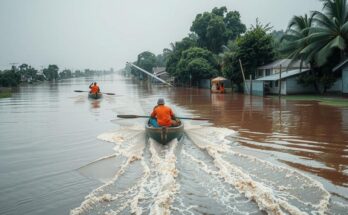Severe flooding caused by torrential rains has affected over 2.7 million people across Chad, Nigeria, and Cameroon, raising urgent concerns about food security as homes and fields are submerged. Action Against Hunger calls for immediate funding, highlighting the critical humanitarian needs in these regions.
Recent torrential downpours have resulted in severe flooding across Central and East Africa, markedly impacting Chad, Nigeria, and Cameroon. The flooding has led to the displacement of over 2.7 million individuals, with Chad seeing approximately 1.7 million affected, Nigeria around one million, and Cameroon more than 230,000. These natural calamities have submerged homes and agricultural fields, raising urgent concerns regarding rising hunger in these nations. In Chad, the relentless rains, which commenced in late July, have wreaked havoc across regions such as Lac, Mayo-Kebbi Est, Mandoul, Tandjilé, and Batah, with Sila province, home to a significant number of Sudanese refugees, also severely affected. To date, the floods have claimed over 500 lives and damaged more than 210,000 houses, while an alarming 880,000 acres of farmland and nearly 70,000 livestock have been lost, exacerbating the food insecurity already plaguing 3.4 million Chadians. Gustave Gnagny, the Country Director for Action Against Hunger in Chad, highlighted the dire circumstances, stating, “The affected populations are facing critical needs for food, drinking water, shelter, health and protection. According to initial estimates, nearly $100 million is needed to bring relief to these stricken populations. So far, barely 10% of this sum has been mobilized.” In Nigeria, the flooding has notably affected various states including Borno and Adamawa, leaving thousands without essential shelter and sustenance. Prior to this disaster, over 32 million Nigerians were experiencing food insecurity, with Maiduguri, the capital of Borno, being particularly hard-hit as 50% of the city was flooded, impacting 414,000 residents. Thierno Samba Diallo, the Country Director for Action Against Hunger in Nigeria, remarked, “The floods have damaged over 300,000 acres of farmland in Nigeria. The damage is likely to exacerbate food insecurity during the current lean season and in the months to come.” Meanwhile, in Cameroon, approximately 236,000 individuals have been affected in the Far-North region, with more than 30,000 acres of crops destroyed. This situation raises concerns regarding the potential spread of waterborne diseases. Pascal Maillard, the Country Director of Action Against Hunger in Cameroon, emphasized, “Certain infrastructure such as bridges and dykes have already collapsed, which will generate massive population displacements. The priority needs are food, shelter and essential household items, as well as access to water, hygiene and sanitation.” The increasing frequency of climatic shocks in the region calls for urgent attention, not only to alleviate the current emergency but also to assist communities in enhancing their resilience to climate change in the future. Action Against Hunger has been actively engaged in providing essential humanitarian support since 1981 in Chad, 2009 in Nigeria, and 2013 in Cameroon, focusing on nutrition, health services, water, sanitation, and food security.
The article addresses the recent catastrophic flooding events in Chad, Nigeria, and Cameroon due to heavy rainfall, which has displaced millions and severely affected agricultural productivity. The situation has heightened concerns regarding food security and the need for immediate humanitarian assistance. The impacts of climate change are noted, underlining the growing frequency of such events and the resulting vulnerabilities in already precarious living conditions.
In conclusion, the ongoing flooding crisis across Chad, Nigeria, and Cameroon has resulted in significant humanitarian challenges, with millions facing food insecurity and displacement. Urgent financial support and resources are necessary to address immediate survival needs and to promote long-term recovery and resilience against future climate shocks.
Original Source: www.actionagainsthunger.org




